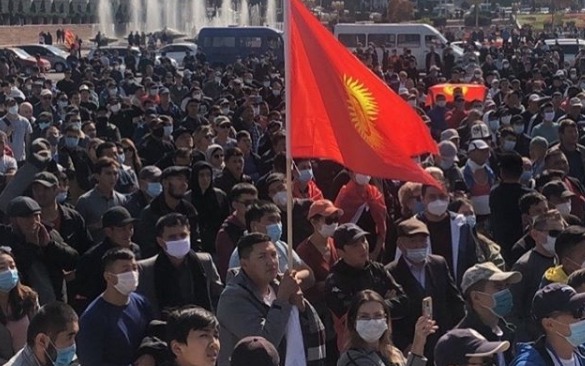ANALYSIS-Coronavirus lit fuse in Kyrgyzstan, spreading unrest in Putin's back yard
When protesters stormed Kyrgyzstan's government building this week their anger was fuelled by COVID-19 hardship, some of them said, the second time the pandemic has stoked unrest across a region Russia's Vladimir Putin considers his backyard. Kyrgyzstan is the fourth ex-Soviet state to be convulsed by instability this year after protesters angry over what they said was a stolen election took over state buildings and rival opposition groups claimed power on Tuesday, a chaotic process still unfolding.

When protesters stormed Kyrgyzstan's government building this week their anger was fuelled by COVID-19 hardship, some of them said, the second time the pandemic has stoked unrest across a region Russia's Vladimir Putin considers his backyard.
Kyrgyzstan is the fourth ex-Soviet state to be convulsed by instability this year after protesters angry over what they said was a stolen election took over state buildings and rival opposition groups claimed power on Tuesday, a chaotic process still unfolding. Belarus was already in the grip of rolling mass demonstrations over what protesters say was a rigged election, and Armenia and Azerbaijan are locked in a conflict over a mountain enclave internationally recognised as part of Azerbaijan but populated by ethnic Armenians.
The unconventional way Belarusian leader Alexander Lukashenko handled the COVID-19 crisis is widely cited by protesters as one of the main reasons they rose up. Lukashenko advised Belarusians to drink vodka, take saunas and drive tractors to keep healthy, but did not enact lockdowns. Kyrgyz protesters say their government, which did lock the country down, left people to fend for themselves at a time when the restrictions had multiplied existing hardships - a major reason anger bubbled over into direct action.
"The government didn't cope with the pandemic, there was no help for us from the authorities," Nur, a 20-year-old student protester, told Reuters. "They gave us a sack of flour, and told us to survive until the end of the pandemic".
Almaz, 18, another student protester agreed: "People were sick and hungry," he said. The immediate spark for the uprising was a feeling that the president, Sooronbai Jeenbekov, and his allies had fraudulently sidelined their opponents in the Oct. 4 parliamentary election.
Competition for control over resources among powerful clans was another factor and anger over alleged official corruption was also building. But the now-ousted government's handling of the pandemic, which peaked in July, appears to be a major driver of a revolt which did not stop when Jeenbekov said election infringements should be investigated and the vote rerun.
Russian President Vladimir Putin's Kremlin said on Thursday Kyrgyzstan was "a mess" and Moscow might have to act. A pre-election poll commissioned by the U.S.-funded International Republican Institute showed 53% believed the country was headed in the wrong direction. Voters' two top concerns: unemployment and the new coronavirus.
Kyrgyzstan, which has reported 48,342 COVID-19 cases and 1,498 deaths among its 6.5 million people, closed its borders, halted domestic travel, ordered most businesses to close and enforced a curfew in the capital Bishkek between March and May. With hospitals full in July, people were forced to obtain their own oxygen supplies, through messengers and social networks. They also had to use poorly-equipped outpatient facilities for intravenous drips which they had to buy themselves.
DEEP RECESSION The border closures hit the economy of the mountainous nation and people's incomes hard due to a heavy reliance on ties with former Soviet overlord Russia and giant neighbour China.
Hundreds of thousands of Kyrgyz routinely travel to Russia for work and the money they send home accounts for a large share of the country's foreign currency revenues. Border closures by both countries made such travel impossible. At the same time, the pandemic severely reduced trade with China, a key driver of the Kyrgyz economy which had for decades thrived as a regional hub for the resale of Chinese consumer goods. Manufacturers also rely on supplies from China.
The economy is expected to shrink 9.5% this year, according to the European Bank for Reconstruction and Development, and to take five or more years to recover to the same per-capita level. Former healthcare minister Kosmosbek Cholponbayev was sacked in April for early-stage pandemic failures. He was arrested just weeks before the election and charged with abuse of office and with signing a suspicious consulting contract.
Kadyr Toktogulov, former Kyrgyzstan Ambassador to the United States and Canada, said the government’s handling of the pandemic "was seen as disastrous". The resulting economic pain definitely helped fuel protesters' anger, he said, as well as a perception the authorities had underreported the number of people infected or killed by COVID-19, something the health ministry denied.
"The authorities failed to prepare the healthcare system for the rising number of cases," Toktoguov said. "The country had to endure quite chaotic weeks when the number of cases and deaths peaked."
(This story has not been edited by Devdiscourse staff and is auto-generated from a syndicated feed.)










